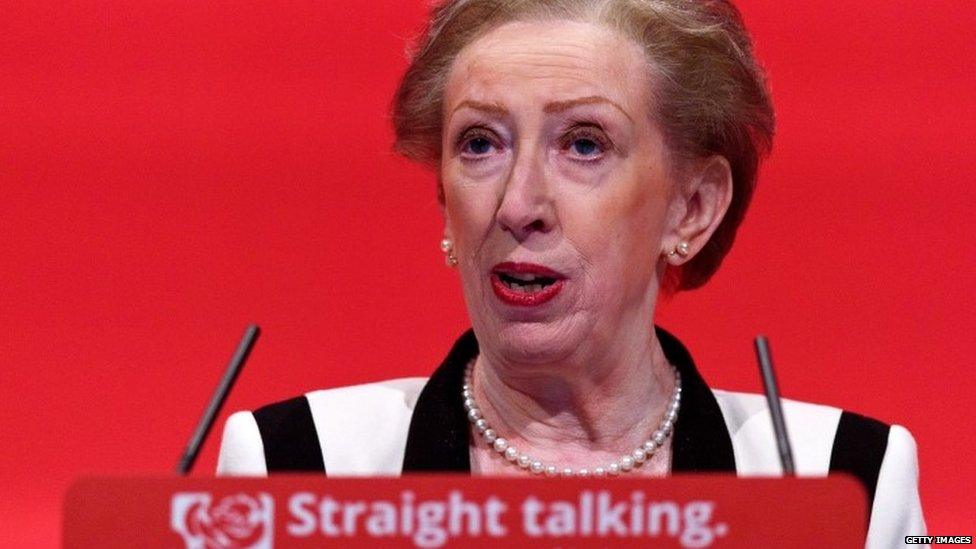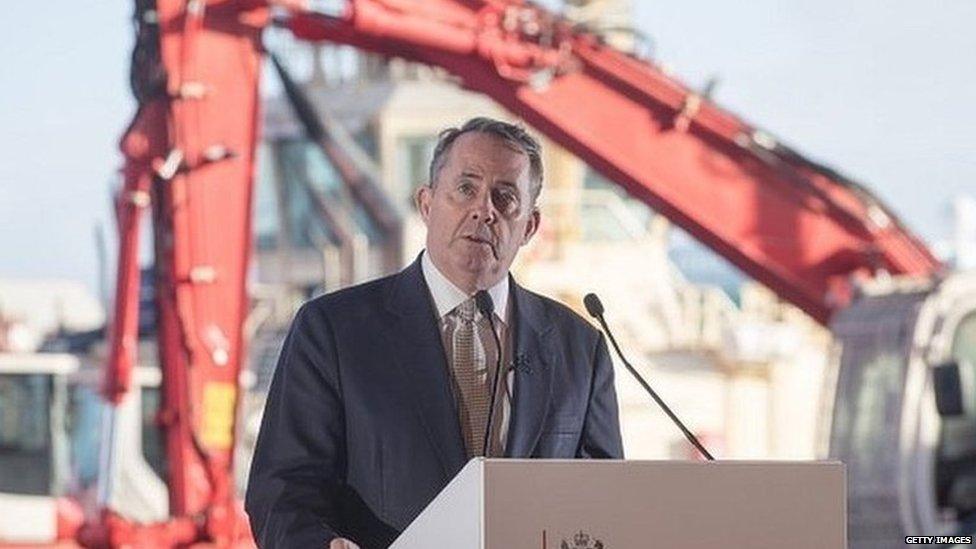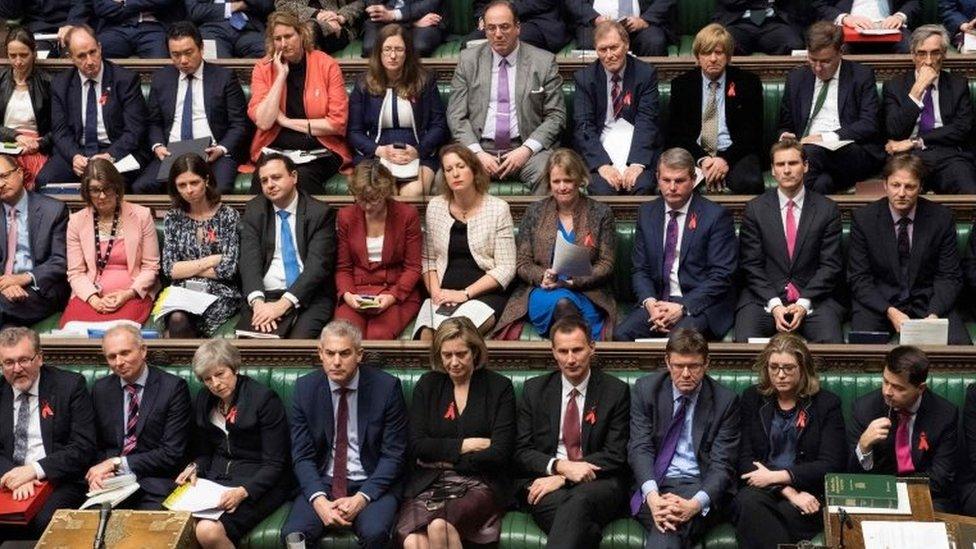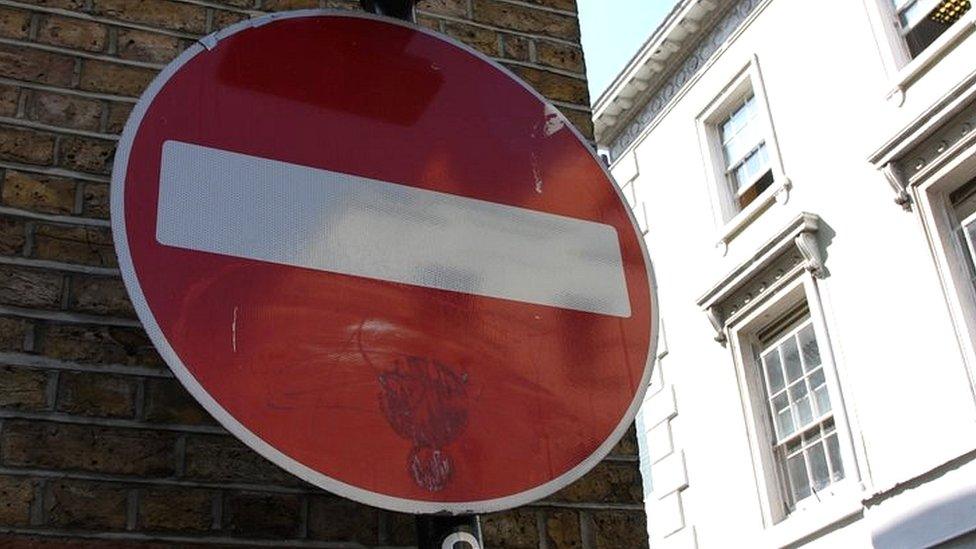Brexit: May not ruling out second MPs' vote on deal
- Published
- comments
Theresa May: "It's our duty to deliver Brexit for the British people"
Theresa May has refused to rule out another Commons vote on her Brexit deal if MPs reject it the first time.
The PM said she thought she could win the vote on 11 December despite dozens of Tory MPs being against the deal.
In an interview with the BBC's Laura Kuenssberg, she urged MPs to "deliver on the vote of the referendum".
EU Council President Donald Tusk warned if MPs rejected the deal, the UK would face a choice between leaving without a deal or not leaving at all.
Under Commons rules, the prime minister is not meant to ask MPs the same question twice - she would have to change the contents of her deal.
Alternatively, if enough MPs indicate they have changed their minds after voting the deal down, it could be held again, but it would be up to the Speaker to decide whether to allow that.
Pressed by Laura Kuenssberg on whether she would attempt to hold another vote, Mrs May - who is in Buenos Aires, Argentina, for a G20 summit of world leaders - said: "I'm focused on the vote that is taking place on 11 December and I want everybody who's going to participate, all members of Parliament, to focus on what this vote does."
Shadow chancellor John McDonnell said he did not now expect any Labour MPs to vote for Mrs May's deal, telling Talk Radio he thinks the party will "hold together".
The Labour leadership has said it is ready to support a cross-party amendment to the vote that would explicitly rule out a no-deal. The amendment would not be binding but it would be hard for the PM to ignore it, if it is passed by Parliament.
European Council President Donald Tusk, meanwhile, has stressed that the deal the EU struck with Theresa May was the "only possible one".
He said: "If this deal is rejected in the Commons, we are left with, as was stressed a few weeks ago from Prime Minister May, an alternative - no deal or no Brexit at all."
But a senior UK official said: "Right from the very outset, Donald Tusk has not hidden the fact that he finds (Brexit) a moment of sadness for himself and for the EU.
"But the prime minister has always been very clear to President Tusk that we are leaving on 29 March next year."
Will the EU re-negotiate?
The BBC's Europe Editor Katya Adler
What is the EU up to while a fevered UK Parliament burns with questions and throbs with Brexit conspiracy theories?
Well, the EU is watching and waiting. Arms folded.
"It's groundhog day in this negotiation process," an EU diplomat told me.
"We (the EU) are again on the outside, watching the UK debate with itself, unsure of what direction to head in. They voted to leave. We've even got an exit deal on the table now but still the UK is undecided."
May's deal v the alternatives?

Margaret Beckett is one of three former foreign secretaries urging another referendum
It is widely expected that MPs will reject the EU withdrawal agreement and blueprint for a future trade deal agreed with the EU.
In anticipation of this happening, some MPs are trying to mobilise support for the so-called "Norway Plus" option, which they claim could win support across the House of Commons.
Under their plan, external, the current withdrawal agreement would be honoured but the UK would seek to rejoin the European Free Trade Association (Efta), which it belonged to before entering the European Economic Community in 1973 - on an indefinite basis.
If Efta's existing members - Switzerland, Norway, Liechtenstein and Iceland - agreed, it would allow the UK to retain membership of the customs union and full access to the single market.
Advocates of the plan say the UK would still be outside the Common Agricultural Policy and the Common Fisheries Policy - but it would also mean continued free movement of people.
Mrs May said this kind of deal would not fulfil the referendum pledge to take back control of the UK's borders, laws and money.
Meanwhile three former Labour foreign secretaries have warned of the damage to British influence around the world if the UK leaves the EU. David Miliband, Jack Straw and Margaret Beckett told the Financial Times, external they all backed the People's Vote campaign for another referendum.
Although Labour is still committed to keeping all options open, Mr McDonnell said if it came to another referendum, it would be "difficult to see" an option to remain not being included on the ballot paper.
Ministers step up efforts to sell deal

International Trade Secretary Liam Fox said the public mood was changing
In a speech in Bristol, International Trade Secretary Liam Fox argued that while the deal will not please everyone, critics "are yet to face up to" the "tough choices" she had to make.
He told the BBC the PM was "changing the public mood" and while different approaches would give the UK a freer hand to strike other trade deals, they would come with a "price" in terms of reduced access to EU markets.
The Financial Times says, external Mrs May is enlisting the support of senior Brexiteers such as Michael Gove and Geoffrey Cox to try to sell her controversial Irish "backstop" plan to sceptical Tory MPs.
Mr Fox said he was not "enthusiastic" about the backstop, which could see the UK enter a customs partnership with the EU until its future relationship is sorted out and without the unilateral right to pull out.
But he insisted the chance of the backstop, described as an "insurance policy" by Mrs May, actually coming into force was slight as it was just as "unpalatable" to other EU members, including the Republic of Ireland.
And Treasury Minister Liz Truss, who is backing Mrs May to get the agreement through Parliament, suggested parts of it could be renegotiated after the UK left the EU.
- Published29 November 2018

- Published5 December 2018

- Published30 July 2019

- Published30 December 2020
